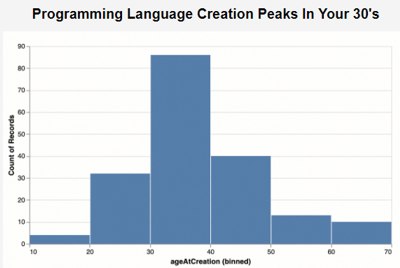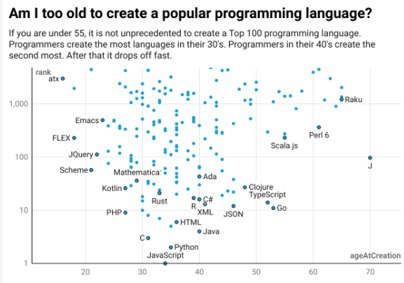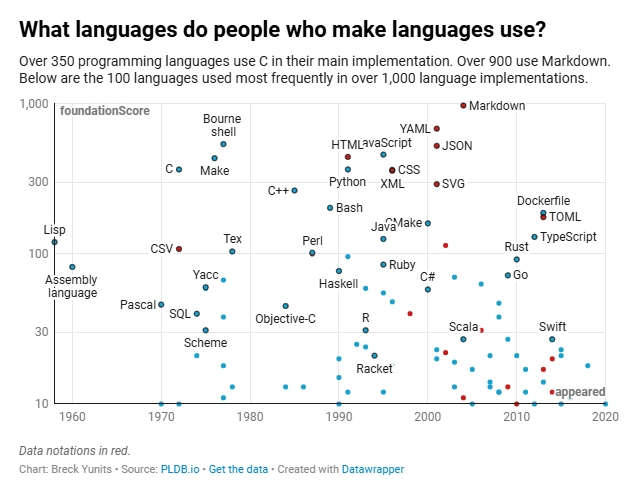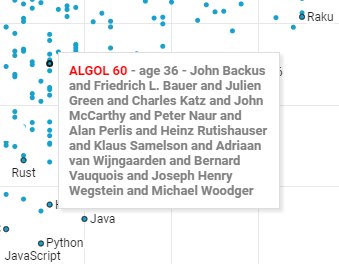| At What Age Do Programmers Write Languages? |
| Written by Janet Swift | |||
| Wednesday, 29 May 2024 | |||
|
This is just one of many question that can be answered by reference to PLDB, the programming language database devised and maintained by Breck Yunits, himself the author of Scroll, an open source static site generator, and its variants. The question that drew my attention to Programming Language Database is "Am I too old to create a popular programming language" a blog post in which Yunits revealed last week that the minimum age for doing this is 16, referring to Aaron Swartz, creator of atx, and the maximum 70, referring to Ken Iverson and J, with the average age being 37.5 and the median 36. He also points to TypeScript, Go, JSON, and Clojure as popular languages that were created by people after age 40. Yunits was able to provide this information having added a new field, ageAtCreation, to the database. On the basis of this histogram, he comments: Programmers create the most languages in their 30's. Programmers in their 40's create the second most. After that it drops off fast. If you want to know more about programming languages and their creators there's a neat interactive graphic, made using Data Wrapper, another resource I'd not come across previously, which gives access to a information provided by PLDB and its sources, the main one of which is Wikipedia: Despite my ignorance of pldb.io, it's been active since 2017 with the goal of building a comprehensive database of programming languages and their common features to assist both the general programmer and the programming language designer. It is a GitHub project and if you want new features you can open an issue or join in the effort to extend the database and the other facilities on the site. There are almost 5,000 entries in PDLB and you can use its Explorer to see information on all of them. It also has a ranking of the Top 1,000 Languages with JavaScript, Python and C in the top three positions. It ranks languages by combining scores for:
foundationScore is new and has been used for this analysis, which you can explore on Datawrapper:
Given that PLDB lets us download all its data, you can use it to answer other questions. For example "How Many Programmers does it take to Create A Programming Language. Ideally this needs another new field in the database, numberOfAuthors, which would let us create a histogram like that for ageOfCreation. But there's an easy spreadsheet workaround. The majority of programming languages have just one author, but where there are multiples " and " is used as separator - so counting the number of occurrences of "and" with a space both in front and after and adding one gives you the number of authors. What I can tell you, by eyeballing the data, is that Algol 60, with thirteen authors has the maximum.
More InformationThe Ages of Programming Language Creators What languages do the people who build languages use? Interactive foundationScore graphic (Datawrapper) Related ArticlesLanguages Closely Tied At Top of TIOBE Index Language Popularity Retrospective The Dance Of The Programming Languages Why Do Some Languages Always Come Top?
To be informed about new articles on I Programmer, sign up for our weekly newsletter, subscribe to the RSS feed and follow us on Twitter, Facebook or Linkedin.
Comments
or email your comment to: comments@i-programmer.info
|
|||
| Last Updated ( Wednesday, 29 May 2024 ) |





